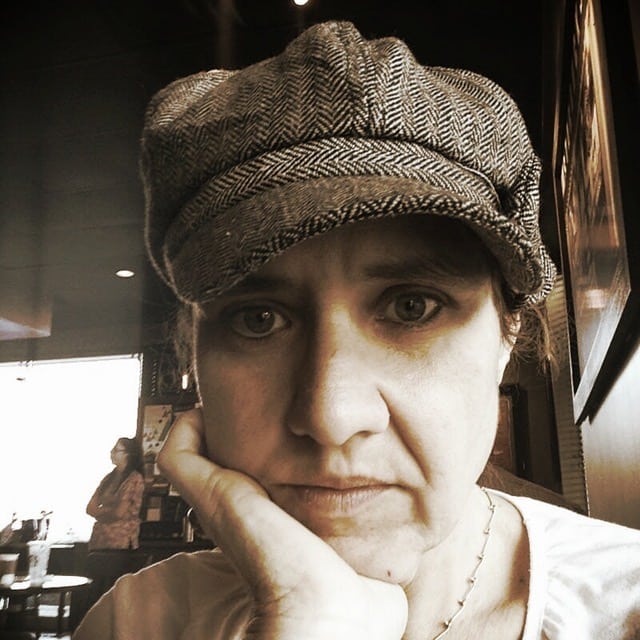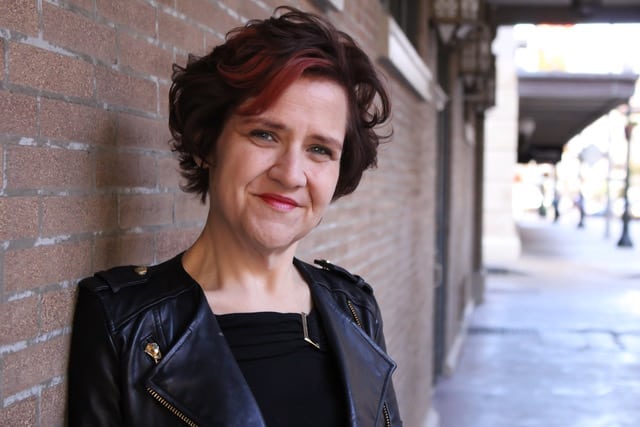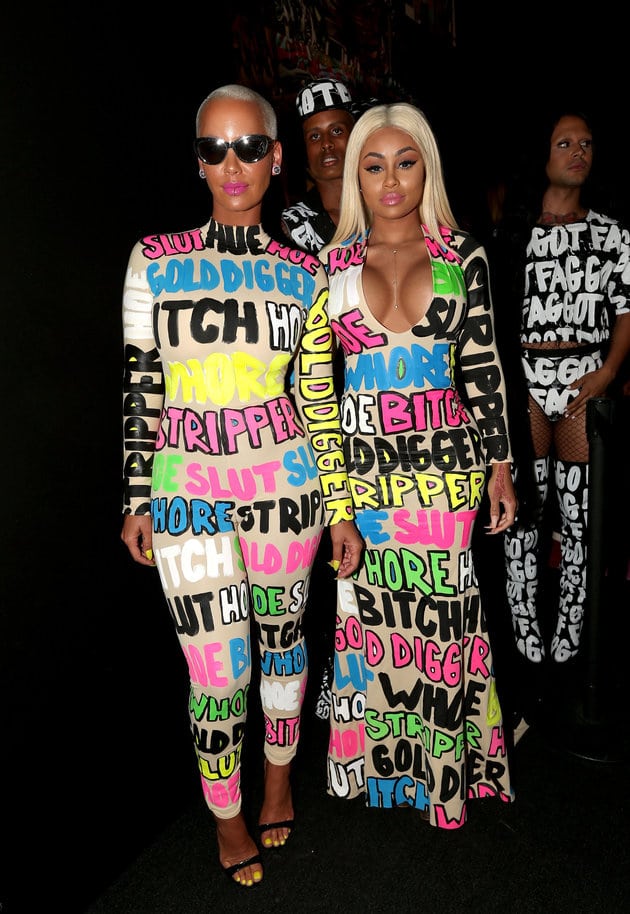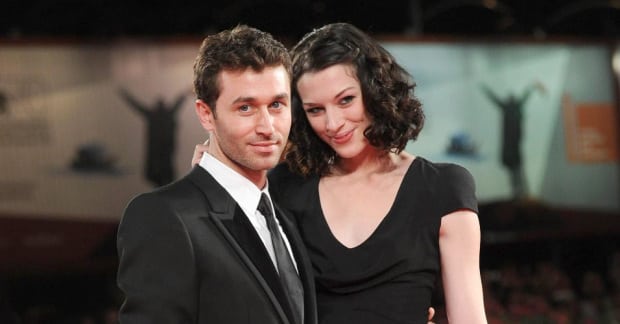Slutty Girl Problems loves women who aren’t afraid to try anything and everything. Recently, we had the chance to chat with Dr. Faith Harper, a woman who wears many professional hats. We asked her about having multiple careers, the amazing zines she makes, and how bad ass, feminist ideals guide all of her work.
Could you share a little who you are and what you do?
I always love this question, though it is sort of a difficult one. Not because I’m trying to be a Bragatha, but because I am in a place in my life where I get to do so much cool shit it’s kinda hard to explain! First of all, I’m a licensed professional counsellor and board supervisor. My expertise as a therapist has been in trauma counselling (my dissertation was about inter-generational trauma). So trauma therapist…THAT makes me fun at parties, right?
When you get down to it, the other stuff I have done over the years has been related to having more tools for treating trauma. I have post-doc certifications in sexology and applied clinical nutrition. I’m also a board-certified hypnotherapist and a YogaFit instructor.
How this applies to what I do may even be more complicated. I have a private practice, which I love. I also have a really varied practice, since I get referrals based on my specialties. And I have bad ass clients who work so fucking hard in therapy it makes my job look easy AF.
I also do a ton of training around the state. Clinical training for other professionals (this part I charge for) and training that makes my community safer and more affirming (this I don’t charge for, this is just what I owe the world).
For example, I’m on the board of The Center – Pride Center San Antonio. We provide Safe Zone (an LGBTQ+ advocacy and awareness program) training, along with many others, anywhere we can manage to be invited in. Every cadet that comes through the police academy spends several hours with us learning pragmatic stuff like how to be respectful to an individual that is trans during a routine traffic stop.
I’m also the clinical director of the Grace Tree Foundation, an organization started by my friend Viana Mora to promote the use of yoga and other somatic practices to transform trauma. Besides the yoga classes themselves, we also provide an enormous amount of training in the community regarding trauma awareness and trauma healing. How we hold trauma in our bodies is HUGE. And somatic work can really be vital to healing for many people. Viana had me in tabletop pose in our class last night, and I had stuff come up that I was able to process in a different way.
I also have an amazing friend and colleague that specializes in recuperative yoga out of Houston. We are co-facilitating our first retreat together that blends yoga, nutrition, and all my brain science geekery in one weekend. Self-promotion time, you can check out more info on that at martiewingyoga.com if you are interested in attending!
Oh yeah, and I’m totally a writer! I’ve got two books and multiple zines out with Microcosm Publishing (and can I say how fucking much I LOVE working with them???) with more being planned. I also write a regular column for Out in SA magazine called “The Intimacy Dr.” and articles for Disfunkshion magazine. And really anywhere else that will let me have a platform!
And because that’s not enough, my husband and I started our own publishing company last year to support not for profits trying to get materials out in the world. We most recently published a treasury of writing from the late historian John Judge, with 100% of the proceeds funding The Hidden History Center, an organization that he created and is still maintained by his surviving partner. SSR Press also publishes some of my odder stuff, like my nutrition books and other smaller-run stuff. Being married to the CEO has its benefits.
You’re a woman of expertise in many professional areas! What does a typical day look like for you?
All that made me sound like a super fancy power broker, right??? Totally not at all. Unless I’m traveling, I’ve got a lot of control over my schedule. My kids are grown and flown the nest so their parenting needs are entirely different than they were even a few years ago.
Generally speaking, my clients need later appointments more often than early ones, so I get up and do a little writing before heading over to my office. Today, I have clients through the afternoon, then am meeting my board interns for group supervision this evening at 6:00, then back to the office at 7:30 for one last client before I head home. Yesterday, I wasn’t in my office so I had my consulting group, a few meetings, a Grace Tree yoga class, and then was helping a friend prepare promo videos for his fundraising drag show in the evening. His show fills the local food banks every holiday season plus it’s epically fun. See, isn’t that a pretty cool day? I get to wear jeans and t-shirts or yoga gear most of the time as well, I’m damn lucky.
How do the ideals of intersectional feminism guide your work?
This question makes me sooooo fucking happy, I can’t even begin to tell you.
Jessica Valenti wrote about the limitations of academic feminism in her book Full Frontal Feminism. She said that she was learning all these amazing ideas, but then had no language to share and communicate them when she went home for a weekend and wanted to talk to her mom about issues. There isn’t a damn thing wrong with an academic lens, but we are realizing more and more that our multiple and intersecting identities need to be considered as we navigate our lives and our advocacy work. And we need better means of communicating what we are hearing. It’s too easy to get sheltered into our own experiences. Have I been heckled and harassed by men in a grocery store parking lot and did that make me feel very unsafe? Absolutely. Am I more statistically likely to be killed? This, too. More so than a trans woman of color? Absolutely not.
Intersectionality is about the deep listening of the experiences of others. And the praxis of theory with the reality of behavioral changes, intervention, and advocacy. If we are not addressing all the different ways the problem was created and what continues to encourage its existence, we aren’t affecting lasting change.
Theory doesn’t get its hands dirty, but intersectional feminists do. We may be fighting for pay equality OR planting a community garden. Both are needed.
One of my interns is working on his PhD right now, and asked me what I thought about clinicians presenting a neutral front in the public sphere. This is the sort of old-school model, but one that is still being taught, at least at his school. I think it’s far more important and even therapeutic for clinicians to be out and public with our advocacy work. More equality means more emotional wellness and that IS the job of a clinician. All the fancy therapy in the world is great, but when a gender non-conforming youth saw me on the news at a town hall protesting SB6 (the Texas bathroom bill which died in the house) that does just as much for their wellness as their actual therapy.
Intersectional feminism means that it affects me even when it doesn’t’ directly affect me. My dad is Choctaw. I was raised in a cultural tradition, where the idea of wellness and progress is symbolized with “the good road.” If someone has been waylaid off the road, you go to them. You help them get back up. You get back on the road TOGETHER. No one gets left behind. We don’t deserve to be on the road, when we have family members who have been knocked off. And, oh yeah, the whole world is our family.
How did the idea of five minute zines come about? And what are your favorite topics to write about?
I love zines. I’m a Gen X-er, so of course I do. I use them in my practice and I use them when I train. There is information out of the traditional media that is transformative to emotional healing. When Microcosm first signed my book Unfuck Your Brain, the idea came up then. Books take years to go to press, zines are quick. I could write on various topics and share ideas about mental health and navigating life in these bite sized chunks. I jokingly called them “Dr. Faith’s 5 Minute Therapy” and the name stuck. I use them with my clients, as do many other clinicians I know. A college on the east coast recently contacted me and let me know they were using them in their clinic as passive programming. Some of my teen clients pass them around their high schools …which is a far better use of their reading time than some of the crap they are sending back and forth on Kik.
That being said, I had to learn to WRITE a zine. That shit actually is NOT easy. My editor at Microcosm, Elly Blue, helped me a ton in that regard. It’s definitely a unique skill to develop!
A lot of my ideas come from Microcosm readers or staff asking for certain topics. Sometimes an idea for one will come out fully formed based on a conversation that I had with someone. The Adulting zine was the product of a conversation my daughter and I had by text when she was 18 and moved out of state. Surviving came from a conversation with my best friend, when he was going through a pretty awful period in his life. But most of the zines don’t come out fully formed. I have a list of ones for development, and I work on them when time permits. But I have to do my own adulting, and make sure that writing that has an established deadline gets done first.
We love the inspiration for your book, Unfuck Your Brain. What tools you do you hope readers will take from it?
If nothing else, the realization that YOU ARE NOT BATSHIT CRAZY. The world may be falling apart around you, and your response to that is entirely normal. It’s really hard to get better if you don’t understand where your response is coming from to begin with.
The book started from the “five minutes of brain science speech” that all my new clients get. It’s called the “brains are assholes” speech and it creates a framework for everything else we do. When a client comes in and tells me “Ugh, my amygdala is being SUCH a fucker today!” I know we’ve taken the shame and stigma out of their trauma response which means other interventions have a shot at really working well.
My interventions aren’t necessarily new and magical things, but “the why” is a recurring theme. Breathing techniques with a longer outbreath calm the tenth cranial nerve, for example. Just like intersectional feminism… taking academic knowledge and moving it into practice.
Also, I worked hard to make complicated brain science accessible. Stephen Porges is a brilliant clinician, but his writing on polyvagal theory is dense and tough to get through. And I write just like I talk (my clients will testify to that!). According to Microcosm, the word “fuck” appears 186 times in the manuscript. I’ll try to beat that number in the next book.
What advice do you have for our readers who are interested in pursuing and balancing multiple careers?
- Think about what the recurring thread in all of your work is. For me, it’s promoting trauma recovery and emotional wellness in my community. Sexology and nutrition and yoga make look disparate on the surface, but that work has the same rooted intent. If your ultimate intent is the same throughout, it won’t really feel like multiple careers.
- Think of everything you have as energy. Your time, your money, your talents. Consider always how you want to spend that energy. I’d far rather have new books to read than a diamond tennis bracelet. I drive an old beater car because that means I have more time to do volunteer advocacy work, and I’m not taking on paid work that I’m not really interested in because I need to make my Benz payment, you know?
- It all falls apart without your own selfcare. You owe the world your service but you also owe the world your joy. Make time for both. It doesn’t have to be a big fancy thing. Sitting down with my husband, a bowl of grapes, a cat or three, and The Great British Bake Off is sometimes an hour better spent than working on my next book project (sorry, Microcosm!).
- Show up, work your ass off, own your bullshit if you fuck up, support and promote the badasses around you, and strive to the best at what you’re the best at. We world changers have shit to do. Let’s get to it!







